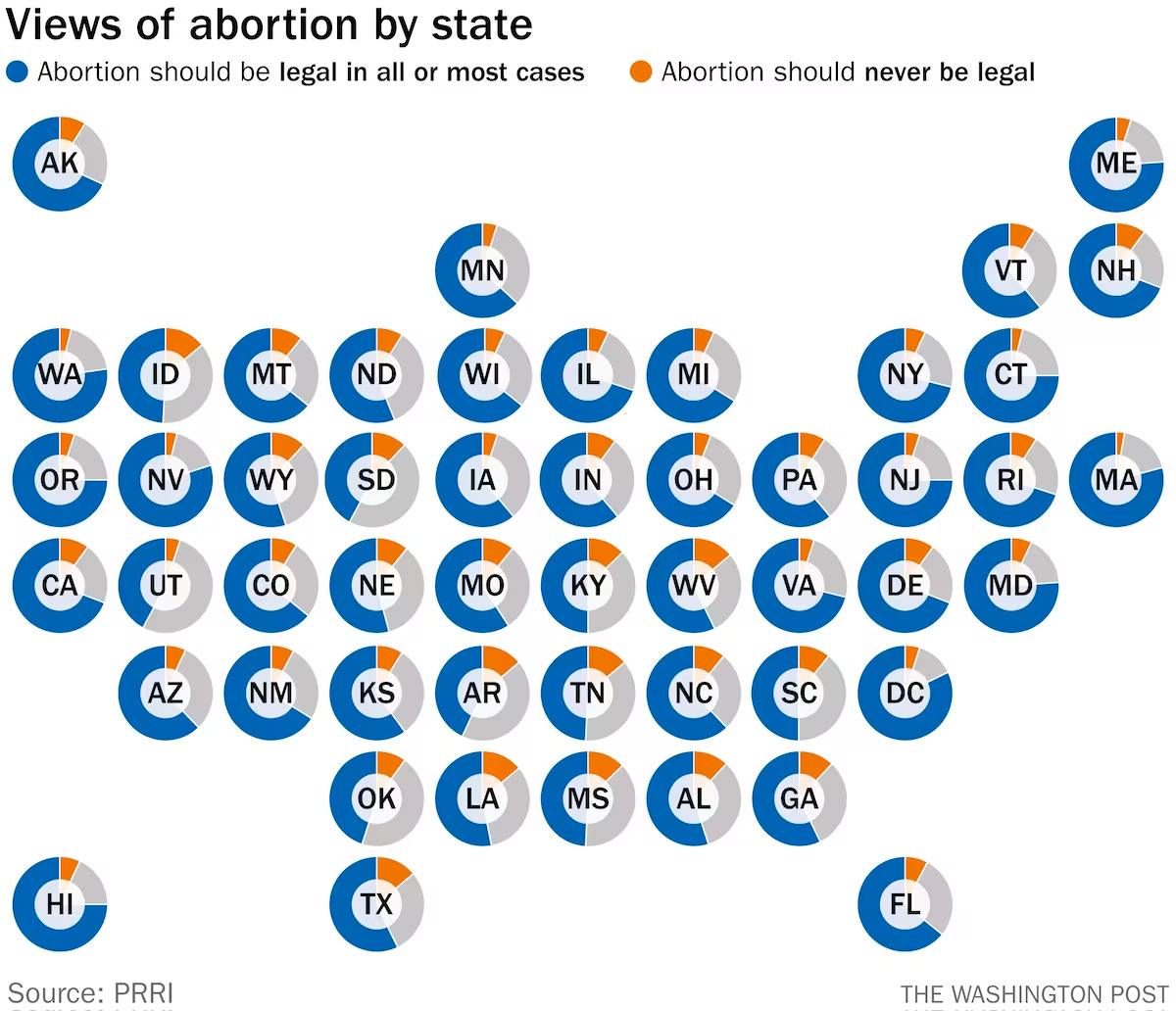In the states…
For years, Republicans have swore up and down that they have no interest in prosecuting women over abortion. We always knew that was a lie, of course—women were being arrested long before Roe was even overturned. But still, they stuck to that messaging. Until now. Over the last week or so, we’ve seen Republicans in Kentucky and Alabama debate bills that would classify abortion as homicide—with the South Carolina GOP considering legislation that would make abortion punishable by the death penalty. Yesterday, Georgia joined the fray: HB496, the Georgia Prenatal Equal Protection Act, which would make abortion after fertilization a homicide. (That means that conservatives who believe that IUDs and emergency contraception stop the implantation of a fertilized egg could argue that a woman who uses those forms of birth control should be arrested for murder.)
Meanwhile, I’ve been telling you about the battle between Tennessee Republicans and Tennessee Right to Life, the anti-abortion group that opposes lawmakers’ efforts to add in an exception for women’s lives. While the organization opposes the bill altogether, the main bit they claimed to take issue with was that the legislation would allow doctors to use their “subjective” judgement on whether or not a woman’s life was in danger. Well, it looks like Republicans have caved to pressure from the organization and amended the legislation:
“Among the changes, all references to ‘good-faith’ judgment on the part of physicians would be changed to ‘reasonable,’ which could increase legal exposure to medical providers who might be charged with a felony for performing an abortion to save the woman or prevent a debilitating illness.”
The new version of the bill also dropped language about medical emergencies, and is so vague that it would be unclear if a pregnant woman with cancer would be able to receive chemotherapy. Even with those changes, Tennessee Right to Life continues to oppose the legislation, saying that “even with slightly improved definitions, this legislation is unacceptable to the pro-life position.”
A Kentucky Republican has filed a bill to add rape and incest exceptions to the state’s total abortion ban—the legislation would make abortion for sexual violence victims legal before 15 weeks if the doctor has a “reasonable belief the pregnancy is the result of rape or incest.” You know what I’m going to say: Exceptions aren’t real.
And while this bill is a slight improvement over others in that it doesn’t seem to require a police report, we’ve already seen that rape victims are unable to get care even when their state’s abortion ban has an exception. (Sometimes because of hurdles to care, sometimes because doctors simply aren’t willing to risk the legal consequences.)
Also, here’s something I didn’t notice about Kentucky’s abortion ban before: It has a requirement that doctors notify the woman’s spouse that she’ll be getting an abortion. And because Republicans are always hilariously on-brand, it looks like the legislation was changed because the language originally assumed the doctor would be male:
Also in Kentucky, Democratic Rep. Lindsey Burke proposed legislation to “unwind the clock” and make abortion legal in the state again.

I’ve written before about the connection between the attacks on abortion rights and those on trans rights—from lawmakers using the abortion bounty hunter laws to go after LGBTQ books in libraries to conservatives using scare tactics around gender-affirming care to try to ban abortion.
Take what’s happening in Maryland, for example, where Democrats are trying to enshrine abortion rights. Because abortion is so popular, Republicans need to target the legislation using a different tactic:
“‘This amendment would take the power to regulate abortion away from the elected officials,’ said Barb Pivec, a member of the Maryland Federation of Republican Women. ‘This bill appears to include again, allowing minors under the age of 21 to consent to surgery to remove their reproductive organs for gender reassignment.’”
We can’t afford to ignore just how interconnected these issues are.
Speaking of that link: In New Mexico, Democrats are pushing legislation to ensure access to reproductive and gender-affirming healthcare in the state. They’ve also advanced a bill protecting abortion providers and patients from out-of-state prosecution and extradition. The bill’s sponsor, Sen. Linda Lopez, says “We want to make sure that our providers are protected so that they are not criminalized by Texas or some other state.” And here’s something interesting—it looks like Democratic lawmakers are using conservatives’ strategies against them: The legislation would also allow prosecutors to file civil charges—with fines from $5,000-10,000—if someone interferes with reproductive health care, and would let citizens sue for damages.
Good news in Wisconsin, where abortion rights have been center stage in the state Supreme Court election: The primary vote pushed forward pro-choice Judge Janet Protasiewicz, signaling serious support for abortion rights in the state. Here’s her campaign ad if you had any doubts:
You may recall that one of the companies that manufactures mifepristone, GenBioPro, is suing West Virginia over their restrictions on abortion medication, arguing that federal regulations supersede state law—which they also say interferes with their ability to do business. This week, state Attorney General Patrick Morrisey asked a federal court to dismiss the lawsuit, saying that the state “retains the power to regulate how drugs may be prescribed and dispensed by medical professionals.”
Lastly, I wanted to flag this terrific comment on yesterday’s newsletter from reader TerriRBG, who notes that legislation seeking to only allow abortions to be performed at hospitals—as Utah Republicans are trying to do—is doubly dangerous “because of the increasing number of hospital systems taken over by the Catholic church.”
Quick hits:
A Florida lawyer is trying to use fetal personhood to argue that his pregnant client’s fetus is being illegally detained (which is kind of brilliant, tbh);
The Mississippi House passed a bill that would expand tax credits for those donating to anti-abortion centers;
Kansas Republicans advanced a bill to ban abortion medication despite the fact that another, similar, law is currently blocked;
Virginia Sen. Barbara Favola says next session she’ll bring back her defeated legislation to ban menstrual health data from being included in search warrants;
Tennessee’s Department of Children’s Services is already overwhelmed, and advocates are worried about the increased strain now that abortion is illegal;
And in today’s ewwww news, Arkansas Republicans want to erect a “Monument for the Unborn” in remembrance of aborted fetuses.
In the nation…
PRRI (Public Religion Research Institute) has a huge new study on what Americans think about abortion, and it proves exactly what you would expect: This country is pro-choice. Overwhelmingly so. Not only do most Americans continue to support legal access to abortion, the percentage of those who believe abortion should be illegal is rapidly declining. And, as feminists have been pointing out for years, it’s not just people in pro-choice states who support abortion. This visual from The Washington Post is useful in understanding just how popular abortion rights are across the country:
I’ll have more on the study tomorrow—I want some time to read it thoroughly—but I really hope politicians are taking note.
The Kaiser Family Foundation has launched abortion-related trackers for both state and federal legislation, and the Center for Reproductive Rights also has a terrific tool tracking state laws.
We know the soon-to-be-announced court decision on abortion medication is going to have a wide-ranging impact on reproductive health, but StatNews points out that the ruling will also determine the future of the way that the FDA approves drugs more broadly: “Let mifepristone go over, and any medicine could end up wobbling on that cliff, too.”
And I’ve been writing a lot here about the various ways that Republicans are trying to undermine the will of voters when it comes to abortion, from changing the rules around ballot measures to raising the standards for injunctions as a way to remove blocks on abortion bans. The St. Louis Post-Dispatch investigates the states where conservatives are trying to limit ballot measures and voters’ ability to make their voices heard on abortion—definitely worth a read.
Please make the time to read this piece from The Guardian that follows a maternal fetal medicine specialist in Tennessee. Dr. Leilah Zahedi-Spung kept a diary for the publication, detailing what her life and work has been like since Roe was overturned. It is, not surprisingly, devastating. She describes the patients she is banned from treating, and the absurdity of trying to do this work in a state that won’t allow doctors to give women the treatment they need:
“I have the ability to provide life-saving care. And I’m being told I’m not allowed to do that because it offends people. It’s so ridiculous. None of these lawmakers even understand the grief that these patients are suffering.”
I feel so grateful for doctors like this, but heartbroken—I cannot begin to imagine what it’s like to do this work right now.
Quick hits:
The editorial board at the Wall Street Journal wrote about Sen. Ron Wyden’s advice to the Biden administration to ignore judge Matthew Kacsmaryk ruling if he bans abortion medication, comparing him to the Proud Boys (?!) and calling him a “threat to American democracy”;
Axios has a short explainer on abortion medication and the ongoing legal battle over the pills;
And Reuters looks at the “uncertain” future of abortion rights laws.
Listen up…
Austin public radio has a short five-minute segment on how the legal strategy in Texas that allowed people to sue over abortion could now be used to file lawsuits over LGBTQ books in libraries. And KCRW has a short episode on the people fighting for abortion rights using religious freedom arguments.
You love to see it…
This is terrific news: A group of pro-choice organizations and private law firms have come together to create the Abortion Defense Network, a project to give legal counsel and representation to abortion patients and providers who need it. The group will also provide funding to cover any expenses related to abortion criminalization, such as legal fees or bail and bond fees. The organizations involved include the Center for Reproductive Rights, the American Civil Liberties Union (ACLU) and If/When/How—which already runs a legal helpline on reproductive rights.
Jennifer Dalven, Director of the Reproductive Freedom Project at the ACLU, says they created the network “to help those involved with abortion care navigate this confusing and hostile legal landscape.”
This newsletter was compiled with the help of researcher Grace Haley.
Listen to this episode with a 7-day free trial
Subscribe to Abortion, Every Day to listen to this post and get 7 days of free access to the full post archives.
















